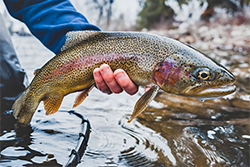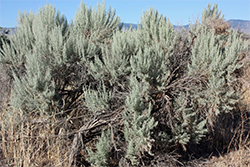Announcements
EPSCoR RII Award
The new NSF EPSCoR research program seeks to understand how genetic diversity and phenotypic plasticity affect species response to environmental change, shaping both population response and adaptive capacity. Two focal taxa will be under study: one aquatic (redband trout) and one terrestrial (sagebrush). These taxa are integral to ecosystems in the American West, and are central to land-use management decisions that drive the economy of the region.

Redband Trout

Sagebrush
Linking Genome to Phenome to Predict Adaptive Responses of Organisms to Changing Landscapes
Research Infrastructure Improvement Track-1 Award (2018-2023)
This award will advance fundamental knowledge on the mechanisms that rule genome to phenome pathways to predict how species adapt to external stressors and a changing environment. It will help translate this knowledge into evidenced-based resource management policies and practices for more adaptive and resilient species and landscapes.
Idaho's approach is through Genes to Environment: Modeling, Mechanisms, and Mapping (GEM3). This statewide project combines research strengths in bioinformatics, complex modeling, ecology, fisheries science, genomics, geospatial science, remote sensing, and social-ecological systems (SES) science to contribute to one of the most compelling and contemporary national challenges of our time – understanding the "Rules of Life: predicting phenotypes from what we know about the genome and environment".
Boise State's HES Initiative
The Human-Environment Systems team is working to solve complex environmental problems and train a new generation of students to meet the challenges of the next century. We believe that meeting the great environmental challenges facing the planet requires understanding the interplay between the biophysical world and our societal actions. We aspire to create knowledge and capacity to address these challenges.
UI Physicist Receives NSF Grant for Genome to Phenome Research
A University of Idaho project examining changes in the amino acids that are the building blocks of life and how they lead to changes in living things was awarded a $6 million grant from the National Science Foundation.
The grant, awarded to Associate Professor F. Marty Ytreberg in the Department of Physics in UI's College of Science, is among eight projects totaling $41.7 million awarded through the NSF’s Established Program to Stimulate Competitive Research (EPSCoR) Program.
Ytreberg's project, "Using biophysical protein models to map genetic variation to phenotypes,” will use computer simulations, mathematical modeling and experiments to determine how amino acid changes modify the way that proteins interact with other molecules.
Read more about Dr. Ytreberg's project
Learn more about the EPSCoR award
BSU awarded $1.7M to study climate change effects on birds
The Department of Defense has awarded a team of researchers, led by Boise State University biological sciences professor Julie Heath, a four-year, $1.7 million grant to monitor the effects of climate change on American kestrels and develop a modeling system that can be used broadly to predict how other avian species will react to changes in weather patterns.
ISU's Sarah Godsey Receives Prestigious NSF Award
Idaho State University geosciences Assistant Professor Sarah Godsey has received one of the "most prestigious awards in support of early-career faculty" awarded by the National Science Foundation. Her award includes more than $500,000 to study streams and stream channels for five years.
The award is part of the NSF's Faculty Early Career Development Program (CAREER). According the NSF, the award is given to faculty "who have the potential to serve as academic role models in research and education and to lead advances in the mission of their department or organization."
The title of Godsey's CAREER award is "Active Learning Across Interfaces: Controls on Flow Intermittency and Water Age in Temporary Streams."
Health of Our Lakes
Idaho Public TV explores the Health of our Lakes, focusing on Fernan, Coeur d'Alene, and Hayden Lakes in North Idaho.
ClimateEngine.org unveiled at White House Water Summit
UI researchers partners with DRI and Google on web application.
